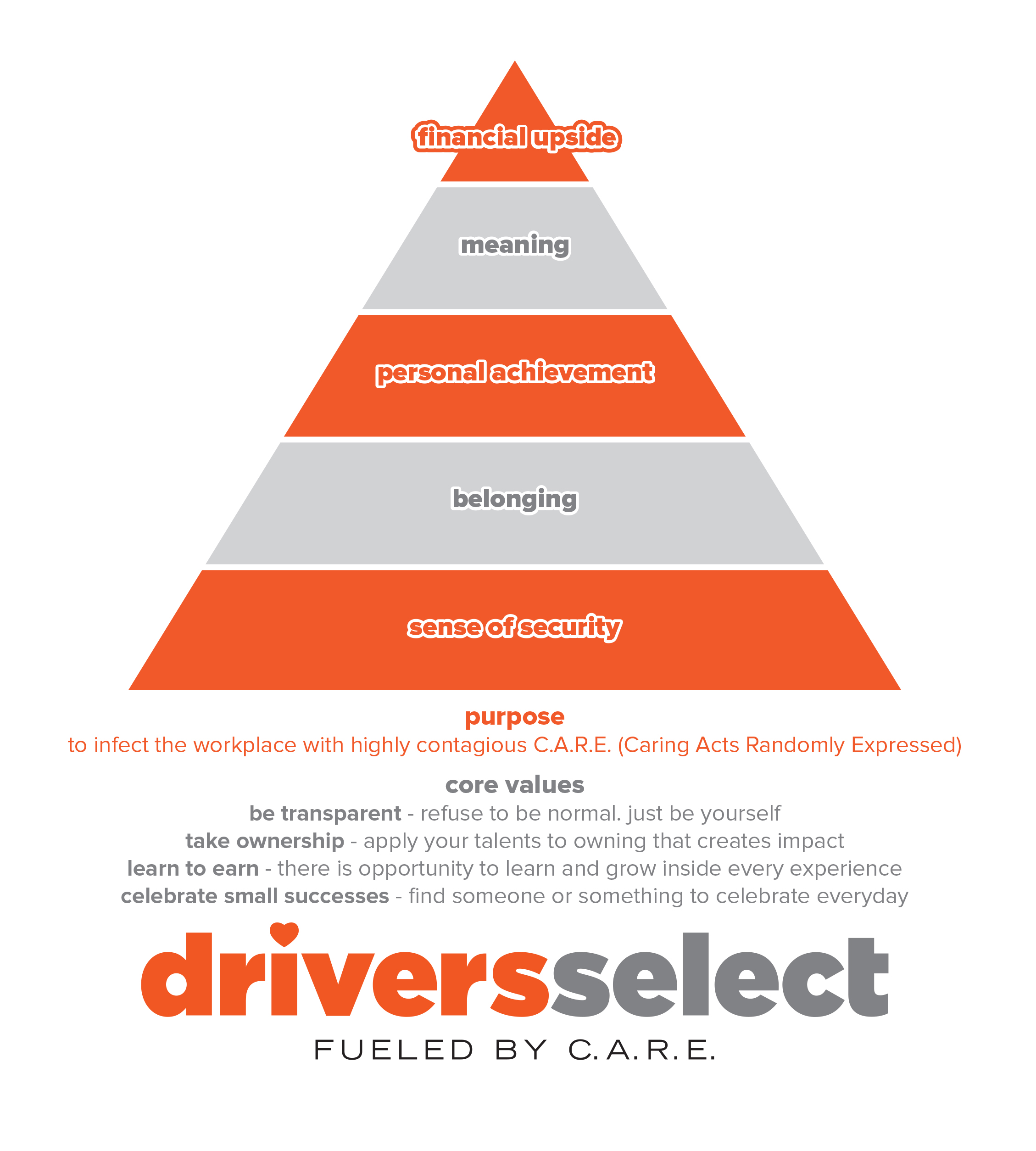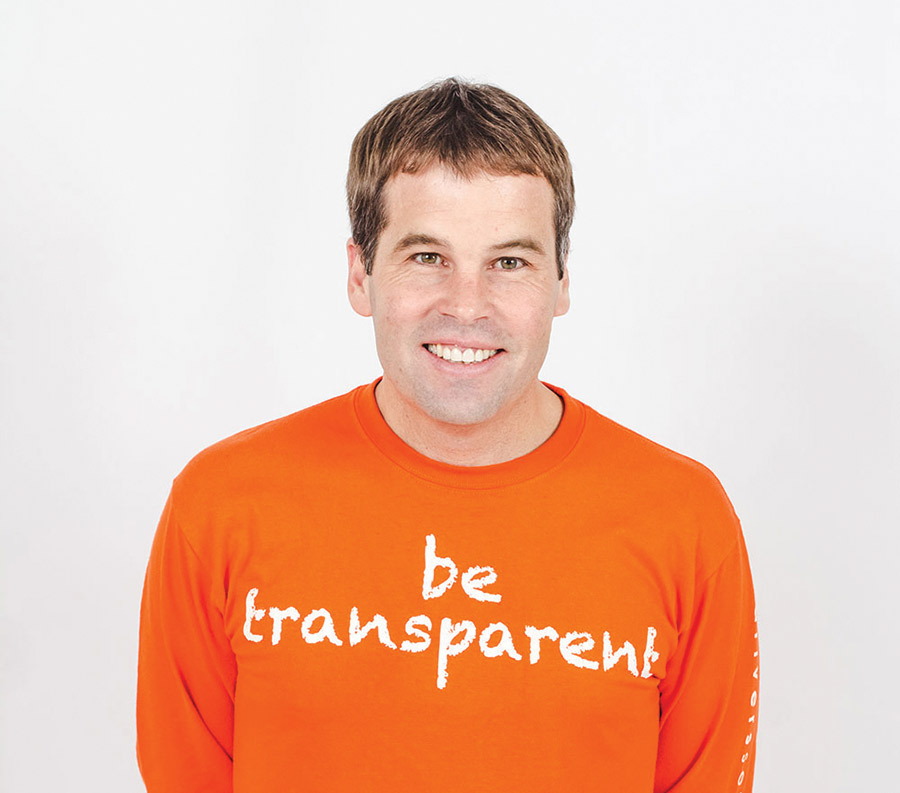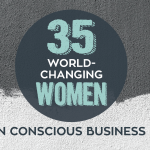Steve Hall founded his Dallas-based used-car dealership at the perfect time. It was 2004, and the market was booming. Everyone wanted a better car, and thanks to high liquidity in the marketplace, it was easy to get financing. “We went from zero to about $70 million in revenue in our first three and a half years, and we were rated one of the fastest-growing companies in North Texas,” Hall says of the time after he founded driversselect.
From the outside, things were looking great, but it didn’t feel that way. “My relationship with my wife was not good, and I hardly spent any time with my son,” Hall recalls. “I wasn’t doing anything socially. My sole focus was continuing to maximize the business in the short term, and I couldn’t figure out why I felt so drained despite the business success.”
Then the 2008 financial crisis hit, and all that rapid growth suddenly slammed to a halt. Hall says the gut-check helped him realize what matters. A singular focus on the bottom line was not fulfilling him. The constant search for “more” left him burned out and frustrated, and he had little left to offer his colleagues — let alone his family and friends. “I told my team, ‘Look, I won’t be around long enough mentally, physically, emotionally, or spiritually to build a great business if it doesn’t align with my values,’” Hall says. So he went looking for a better way — and found one in the Conscious Capitalism community.
Since 2010, driversselect’s purpose “to infect the world with highly contagious care” has sent revenues soaring. In fact, the strong values-driven performance was enough to grab the attention of Fortune 300 company Sonic Automotive, which acquired driversselect in September 2017. “Now we get to take our purpose and infect their 10,000 associates with our culture of care,” Hall says.
While a used-car dealership may not be the first business that comes to mind when you think of a conscious company, driversselect demonstrates that a values-driven model can work in all kinds of sectors. We spoke with Hall to find out more about the recent acquisition, his transformational experience, and how other companies can follow suit.
driversselect At A Glance
• Location: Dallas, TX
• Founded: 2004
• Team Members: 380
• Traction: Has served over 50,000 customers in the Dallas area
• Impact: $45,000 donated in 2017 to nonprofit partners
• Recognition: Dallas Business Journal Best Places to Work 2016 and 2017; Dallas Morning News Top Workplaces 2016 and 2017; Steve Hall was recently named to Conscious Capitalism International Board of Directors
• Structure: For-profit subsidiary of Sonic Automotive
• 2017 Revenue: Over $200 million
• Purpose: “To infect the workplace with highly infectious CARE (caring acts randomly expressed).”
What’s your elevator pitch for business leaders about the way you do business differently?
Steve Hall: Stakeholder orientation is the easiest way to start talking about it. Every company is connected to its employees, customers, suppliers, and communities. If one or more of those stakeholders is rooting for you to lose or go out of business, it’s going to be tougher. And you have a lot of control over how you invest in those relationships.
I ask people, “What’s the relationship you would love to have with your suppliers?” “What’s the relationship you would love to have with your customers, beyond what you want them to do or buy?” If they start talking about these relationships, I can tell they’re interested in building a conscious company. I don’t want to spend too much energy trying to convince people this is a good thing for them, because it’s not for everybody, but people who are already on the journey often just need some encouragement or some more examples of what works.
I just tell skeptics, “Look, if you’re happy with the way your business is and you’re happy personally and professionally, keep doing what you’re doing. But if you think that personally or professionally things could be a little better for you and you want something a little different, I’m happy to share our journey and tell you about how it’s been for us,” and then they can decide from there.
Would you tell us about your journey?
SH: When driversselect got started, I wanted to serve a disenfranchised consumer base — people with credit problems — who were subject to predatory practices elsewhere in the industry. Good people who encountered situational circumstances that damaged their credit, such as a divorce, illness, or personal bankruptcy, had a lot of trouble getting car loans and were often pushed into older, higher-mileage cars. With so much liquidity coming into the marketplace in 2004, banks were much more willing to lend, and I saw an opportunity to build a retail model in which subprime consumers could drive the same nearly-new vehicles available to those with good credit.
But I quickly found that the banks were willing to finance anybody. It wasn’t just those who had fallen on tough times. People with multiple repossessions and a history of poor financial decisions were also getting loans, even if those loans were likely to result in another repossession. Meanwhile, the type of employees I was hiring didn’t align with my values: they would sell a car to whomever just to get a transaction. We were all just chasing growth. It didn’t feel purposeful, but I didn’t know any other way. I figured, “This is just business.” It was all about scale and getting big and locations and visibility. But the better the business did, the bigger it got, the worse I got. I wasn’t eating well, I wasn’t exercising, I was just pushing for more and more.
I have three sons, aged 11, 8, and 3, and I can think of two moments with them that really defined my mindset shift. For years, I came through my front door with a cell phone in my hand. When my sons ran up to me, I would shush them. One day, I didn’t have anything to do in the evening and I thought, “I’m going to go home, and I’m going to be with my family.” I walked in the door and opened up my arms, but no one was there to greet me. They were all doing their own thing. I realized how many times I’d come through the door and ignored all of them, and I wondered how many other life experiences I missed out on because I simply wasn’t present. I realized I needed to build a business that didn’t take me away from the people I care most about.
Another day, I was dropping off my middle child for his first day of kindergarten. He’s a little introverted, and I remember thinking: “I hope he has a great day. I hope he meets friends and has a good teacher who inspires him to learn.” Then I wondered how many kids made similar wishes for their parents: “I hope dad or mom has a good day at work. I hope their bosses are good to them so they won’t come home in a bad mood.” I started thinking about the conditions I was creating at my company. Was I sending people home in good moods that allowed them to be present with their families, or were they defeated, stressed, and burned out? That thought really opened my eyes to the impact I have on people’s home lives, because I had been there. I walked through that door, saw my family not react to me, and realized how I’d let work come between us.
Fortunately — not from a financial standpoint but from a wellbeing standpoint — the 2008 financial crisis hit. Having a crisis break your business apart allows you to look at the business in a different way. It’s frustrating, but at the same time, you get to put those pieces back together. I got involved with the Stagen Leadership Academy and some integral leadership programs. I read Greg McKeown’s “Essentialism” and attended my first Conscious Capitalism CEO Summit.
All of those things woke me up to a different way to build a business: realigning the company with your
values, thinking about the long term. I realized there was a different way. A company’s people and its stakeholders can be more than the means to a profit. In fact, profits can be the means to creating value for stakeholders. It was almost a reversal of how I saw the business before.
And being the sole shareholder, founder, and CEO, I realized I could shape the business the way I wanted. It started around picking four core values that were important to me (see below). I didn’t want too many, because I knew I had to model them every single day.
 How did you settle on those four core values? What was that process like?
How did you settle on those four core values? What was that process like?
SH: You can either decide “Who do I want to be?” and do aspirational values or you can look at it and say, “Who’s the person I believe I can commit to being every single day?” And that’s mainly who you already are.
I spent some time talking to my parents about who I was as a kid. My wife was very influential. Close friends, mentors, coaches, people who know you really, really well, they know the best, they know the worst of you. They helped me really define who I was.
What makes something really a “core value” in regard to how you operate the business?
SH: Core values are values you’d uphold even if they become a disadvantage. For example, back in 2011 and 2012, auto dealerships largely refused to give out information. They’d barely tell customers the price of a car, and when the customers came in, the dealers undervalued their trade-ins, overcharged them on financing, and added a whole bunch of unnecessary products. One of our core values is transparency, and we decided to reveal the whole price up front — interest rates, down payments, monthly payments, tax and tag fees, warranties, everything — in order to be true to that tenet.
Some people thought it was crazy for us to show the full price — the good and the bad — while our competition was showing only the good stuff. For a short time, we lost business because people would say, “That looks good, but I got a better deal over here.” Through that process, we learned that trying to build a business model that adds value to everybody only results in bringing average value to a bunch of people. There’s a niche of customers who value having all the facts and figures up front, and that’s our customer. It’s a much smaller percentage of the market, but we’re able to speak directly to them.
Another more recent example was around the acquisition by Sonic Automotive — we called it the “Sonic Boom.” I spent a lot of time with our leadership team about how and when we were going to announce it internally. All the advice we got was, “You can’t announce anything until it closes. If you tell the entire tribe” — that’s what we call our employees — “and it doesn’t go through, it could really put you in a bad shape.”
We wrestled with it. We asked, “How would we like to find out about this?” Eventually we decided that the risk of them hearing about it from anybody but me was just too high. It wasn’t the operational risk. It was the fact that one of our core values is to be transparent.
When you make a value core, it tests you to see how much you’re willing to do . It’s easy to be transparent when it’s favorable to the business, but are you willing to take the risk when there’s a lot of uncertainty?
It was a real test for me. At the end of the day, I made the decision that there was much more risk in not living the values than the risk of the deal falling through. So as soon as we signed a letter of intent around the acquisition, even before the purchase agreement, the due diligence, or the close, we told the entire company. We told them there was some risk that it may not go through, but we told them. Our attorneys just went crazy.
How did you decide to join forces with a bigger company after working so hard to build driversselect?
SH: Sonic Automotive has over 100 new-car dealerships all over the country and a used-car brand called EchoPark. They were traveling to Dallas and a couple of their general managers told them about our operation. So their folks stopped by to do a tour, and that led into a six-hour conversation.
We were sharing with them how this culture of care really drives the success of the business. We believe that’s a big part of the metrics that we’re achieving. I can’t tell anyone else how it will impact their business; all I can tell you is how it’s impacted mine: net profit increased from $50 million to over $200 million in five years. The Dallas Business Journal and Dallas Morning News voted us a Best Place to Work, and our Glassdoor rating reflects how happy our employees are.
They were asking about where we’re buying our cars, how we’re pricing them, how we’re marketing them, and we kept taking them back to, “You guys know how to do all those things. We don’t have better access than a 10-billion-dollar company like yourself. We just take a different approach.”
We started talking a lot about the culture and Conscious Capitalism and how our stakeholder orientation allows us to drive more engagement from our tribe, more creativity and innovation from our key suppliers, how we use our culture of care to drive loyalty in our customers and gain the support of our community. They started to grasp the tenets.
A couple of weeks later, we went to Charlotte, where they’re based, and we were just blown away by the technology they had built. One of the things about being an independent regional business is it’s cost prohibitive to build custom technology. You can do some limited customization, but almost forces you to do business the way the other dealers are. We also saw that they had great training resources, real estate resources, some great benefits for their people. We were really intrigued. That conversation led into talk of an acquisition.
The first thing we asked them was, “How can you be better stewards of our stakeholder community than we can doing it ourselves?” We went line by line with each stakeholder. And they gave very specific examples. Maybe they weren’t investing at the level that we were, but we could tell they placed high value on their stakeholder community. Even though they’re a publicly traded company, they’re family-controlled by the founders and they talked a lot about the long game.
When we looked at our higher purpose of infecting the workplace with highly contagious care, we felt that the Sonic Group had a platform to help us scale at a much faster pace than what we could achieve individually. They had the resources to help us achieve a much bigger vision.
I’ve just been super impressed with their level of humility. It’s only been since late September, but they’re showing up with, “How can we support you, how can we learn from you?” What’s really encouraging is they’re starting to adopt some of the language that we use. Things like tribes and rhythms and routines that we’re doing. Vulnerability.
How has it been, letting go of control?
SH: I’m learning about myself. I’m learning there’s another stakeholder now — the shareholder — and I have to take their perspective into play. That doesn’t change the commitment to the purpose, but it does change possibly how I get there. I have to think, “What’s the impact a decision is going to have on the parent company?”
The real test for us will be, if they start to accelerate our growth, how will they balance growth and culture and making sure that we don’t grow revenues faster than culture for a long period of time? That’s going to be where I’m paying a lot of attention. What’s the health of the culture? Are the values strong? Is the purpose clear? Are people really buying into the mission and vision?
What is it that you’re really trying to hold on to now? Can you pinpoint a secret to your success?
SH: The best strategies in the world won’t matter unless you have the right people supporting your company — and I mean all stakeholders: employees, customers, suppliers, communities, investors, consultants, and, if applicable, shareholders. Our company grew not only because we found a way to create value for our stakeholders, but also because of the work we’ve done culturally. Our four core values are a common purpose that drives engagement, loyalty, commitment, and support inside our company, and our other stakeholders respond to that.
This is how conscious leadership works. When people are vulnerable, they get the real issues on the table, even if they’re a little messy. Our tribe is willing to support each other and help each other grow, because they know we grow best together.
What’s the biggest leadership lesson you learned through your whole journey?
SH: One big difference is the timeframe in which I’m managing the business. I think I’m at my worst when I’m getting involved in day-to-day, week-to-week, month-to-month, even quarter-to-quarter type initiatives and
decisions. I make the biggest impact on the initiatives that are one to five years out — things like talent management, things like driving the culture, messaging — the long-term strategy and key relationships that we form.
I also learned that it’s not all about me anymore. When I was working in a shareholder-driven model, I assessed every relationship based on how it could help me achieve my goals. When we as a company reversed that and strived to create value in each of our stakeholder relationships, people leaned in. They were more caring and more supportive. They rooted for us and were willing to help us. It’s a completely different relationship, and that’s what creates the emotional, mental, physical, and spiritual change. 

driversselect CEO Steve Hall
Steve Hall’s Top 3 Pieces of Advice for CEOs
1. Make sure that the business is aligned with your personal values.
One of my mentors early on told me that as a CEO, your whispers come across as shouts. It’s true that the smallest thing I say or do has these huge ripple effects through the organization. Your personal values have got to be aligned with the business.
2. Think long term.
Think about the business in a decade, and your decision-making probably changes. Who you choose to join your tribe will matter more. The decisions you make about how to position the company, how to grow the company, how to treat each of your stakeholders changes when you have a longer time horizon. The way you make and invests profits changes.
3. Who you’re on the journey with matters a lot more than where you’re going.
Nothing is going to have a bigger impact on your mental, physical, emotional, spiritual health than the people you have to be around every day. Whether that’s your customers or your employees or your suppliers, your consultants or whoever you identify as your stakeholders, it’s going to have a tremendous impact on you. Be very intentional on who you choose to bring along on the journey.




